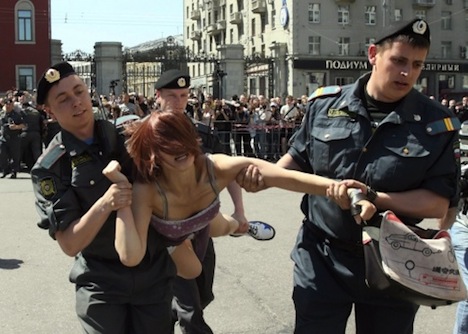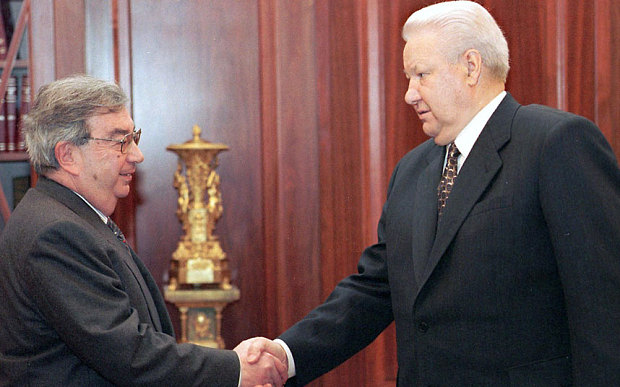
Dan Savage, when he’s not answering the love and sex queries from anguished writers to his column, has now taken it upon himself to become the arbiter of outrage about Russian treatment of LGBT rights. Savage, taking on the burden of activist-in-chief for the U.S. LGBT community, has started a campaign demanding that bars throughout the United States start boycotting all Russian vodkas:
Savage, taking on the burden of activist-in-chief for the U.S. LGBT community, has started a campaign demanding that bars throughout the United States start boycotting all Russian vodkas:
If you drink a Russian Vodka like Stoli, Russian Standard, or any of the other brands listed above, switch to another brand from another country, or even a local brand from a local distillery. Stoli is the iconic Russian Vodka and it’s returning to Russian ownership in 2014. Other brands like Russian Standard should also be boycotted. Do not drink Russian vodka. Do not buy Russian vodka. Ask your bartender at your favorite bar—gay or otherwise—to DUMP STOLI and DUMP RUSSIAN VODKA.
The SPI Group, which owns Stolichnaya*, responded with a defensive letter to The Advocate and other sources earlier today, outlining its ongoing outreach to the LGBT community and noting that, at least as of today, their vodka is produced from Russian ingredients in Latvia, which is of course a NATO and European Union member, and earlier this month secured its entry early next year to the eurozone single currency:
Stoli’s production process involves both Russia and Latvia. Stoli is made from Russian ingredients (wheat, rye and raw alcohol) blended with pure artesian well water at our historic distillery and bottling facility Latvijas Balzams in Riga… We fully support and endorse your objectives to fight against prejudice in Russia. In the past decade, SPI has been actively advocating in favor of freedom, tolerance and openness in society, standing very passionately on the side of the LGBT community and will continue to support any effective initiative in that direction.
There’s some debate over whether the brand will revert to Russian ownership in 2014, but that really doesn’t matter — neither Stoli, the SPI Group or any other major Russian vodka company is owned by the Russian government. It should miss no one’s attention that much of public-owned industry from the Soviet era was privatized for fire-sale prices in the first years of Russian president Boris Yeltsin’s administration. Whether you think that the oligarchs that benefitted from those poor Yeltsin-era decisions are culpable for their own economic sins, they are not the ones setting anti-gay policy today in Russia. Many oligarchs, such as Mikhail Prokhorov, the owner of the New Jersey Nets (now Brooklyn Nets) basketball team, who made his fortune chiefly in nickel mining in the 1990s, actively supports the opposition and ran himself as a candidate against Putin for president last year. Earlier today, the European Court of Human Rights ruled that aspects of the trial against Russian oligarch Mikhail Khodorkovsky were unfair (though the court avoided the legal finding that the trial is politically motivated, as been widely alleged for a decade).
Savage’s campaign would be like Russian bars boycotting Coca-Cola in 1996 in retribution for the U.S. Congress’s decision to pass the Defense of Marriage Act. If Coca-Cola happened to be a Canadian company. And that doesn’t make an incredible amount of sense.
The latest kerfuffle reached a roar in the United States following an op-ed by Harvey Fierstein in The New York Times last Sunday accusing Russian president Vladimir Putin of scapegoating gays and lesbians following the passage of high-profile legislation that bans the adoption of Russian children by gay parents and that allows the harassment and detention of gay and lesbian foreign nationals in Russia:
Mr. Putin’s campaign against lesbian, gay and bisexual people is one of distraction, a strategy of demonizing a minority for political gain taken straight from the Nazi playbook. Can we allow this war against human rights to go unanswered? Although Mr. Putin may think he can control his creation, history proves he cannot: his condemnations are permission to commit violence against gays and lesbians. In May a young gay man was murdered in the city of Volgograd. He was beaten, his body violated with beer bottles, his clothing set on fire, his head crushed with a rock. This is most likely just the beginning.
Nevertheless, the rest of the world remains almost completely ignorant of Mr. Putin’s agenda. His adoption restrictions have received some attention, but it has been largely limited to people involved in international adoptions.
It should be no surprise to anyone that Russian policy — and representative Russian views — on homosexuality is troubling, and that’s something we should all be concerned about, and many of us have been concerned about it for years. Former Moscow mayor Yuri Luzhkov initiated a tradition of using police violence to shut down Moscow’s annual pride parade that’s now seven years running (attacks on the 2011 parade pictured above).
It’s fair to say that Russia is one of the least LGBT-friendly countries in the world, let alone in Europe.
But it’s also one of the least friendly countries in the world to be a journalist, to serve in the armed forces, to have too dark a skin tone, to speak out against the government, to be relatively poor, to be too rich for your own good (in the eyes of the government, at least), or to be unfortunate enough to serve time in prison.
And it’s been that way — for gays and for everyone else — long before the decision that Sochi would host the 2014 Winter Olympics.
That the latest LGBT protests in the United States follow the promulgation of two laws that are particularly geared toward discrimination against gays and lesbians outside Russia leads to the uncomfortable possibility that the Johnny-come-lately crusade against Russia’s laws is motivated by a mostly self-serving, nazel-gaving campaign that’s based less on protecting Russian gays and lesbians and indignation about the treatment of U.S. gays and lesbians — and it’s not clear that kind of effort won’t be even more harmful in the long run by giving Putin a new reasons (anti-American nationalism) to persecute Russian gays and lesbians further. Continue reading Why Dan Savage’s campaign against Russian vodka is naive and counterproductive →
![]()


